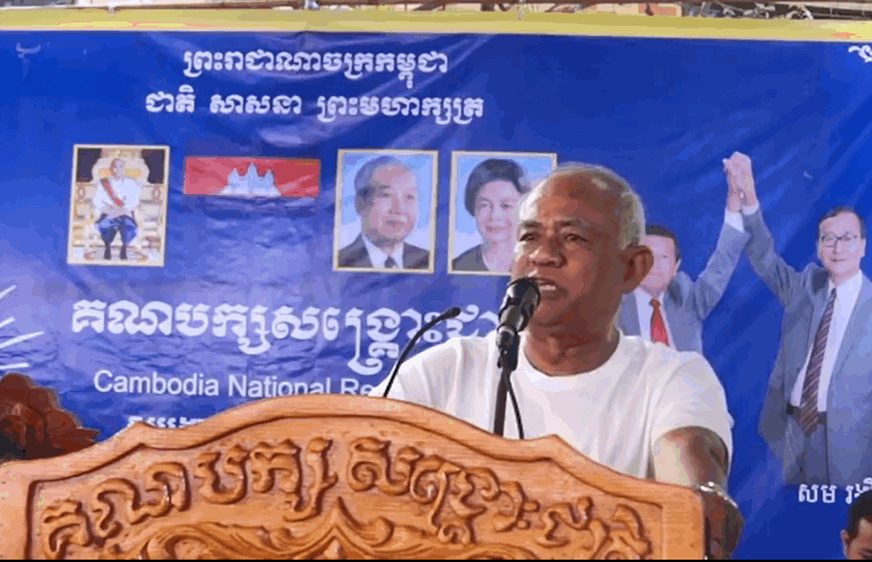A former vice president of the outlawed opposition CNRP has broken with the strident wing of the party in asking the government to be reinstated to politics this week, a course of action that a party co-founder has previously criticized as effective betrayal.
Pol Ham, one of three former vice presidents of the CNRP, requested the Interior Ministry to lift his ban on political activities in a letter dated May 17.
The CNRP was formerly Cambodia’s primary opposition party, closely contesting elections in 2013 and 2017. It formed as a merger between the Sam Rainsy Party and former Cambodian Center for Human Rights director Kem Sokha’s Human Rights Party.
The three party vice presidents were selected in 2017 when Rainsy, saddled with court convictions, resigned as president in a bid to evade a newly amended Political Parties Law and save the CNRP. Sokha, formerly vice president, stepped up as president, and three vice presidents were chosen — two Rainsy loyalists and one Sokha ally.
Of the party’s three vice presidents, Mu Sochua and Eng Chhai Eang were former Sam Rainsy Party members and remain close to the charismatic and controversial co-founder Rainsy, who has been living in exile in France since 2015.
Ham was a former Human Rights Party member.
In November of the same year, the CNRP was controversially dissolved by the Supreme Court, leaving the country without an effective opposition. Some 118 of the party’s top officials were banned from politics, but the government created a system of “political rehabilitation” to allow them to apply to have the ban lifted.
Sochua has called the system an attempt to divide the remnants of the CNRP, while Rainsy has called it effective betrayal.
Interior Ministry spokesperson Khieu Sopheak said on Tuesday that the ministry had received Ham’s letter and it was under review.
Sok Eysan, spokesperson of the ruling CPP, said the request for political rehabilitation was admirable.
“We are happy with them that they have made the right decision to regain political rights,” he said.
Eysan added that he was not worried about Ham contesting future elections, or losing votes to a new party made up of former members of the CNRP. “There is no concern,” he said.
Since the party’s dissolution, Rainsy has continued to be a loud critic of the ruling party, frequently posting to Facebook and encouraging acts of defiance among the public.
Sokha, the other CNRP co-founder, was arrested in 2017, put under house arrest, and remains under court supervision as he awaits the continuation of a treason trial against him, which began early last year but was postponed due to Covid-19.
Unlike Rainsy, Sokha has urged restraint, saying people should be “abandoning insults.”
After the CNRP was dissolved, Ham told the Phnom Penh Post that he wanted to retire to a pagoda. Ham could not be reached for comment on Tuesday.
Some former CNRP members who have chosen political rehabilitation have yet to announce their future plans, including prominent lawmaker Son Chhay.
Others have established new political parties, such as Ou Chanrath’s Reform Party, Kong Monika’s Khmer Will Party, Chiv Kata and Kang Kimhak’s Cambodian National Love Party, and Real Camerin’s Khmer Conservatism Party.
Twenty-four former CNRP officials have so far applied for political rehabilitation.
Phan Chansak, another former CNRP official who applied for political rehabilitation this week, said he would be joining Chanrath’s Reform Party to help it contest the 2022 commune elections.
“This is a suitable time for us to come out to join together and form a new political pole so that we can weigh against the ruling party and compete in the commune elections,” Chansak said.
In 2017, the CNRP won 5,007 commune seats, which were redistributed after the party’s dissolution. The following year, without an effective challenger, the ruling CPP won all 125 seats in the National Assembly.
“We will pull a piece of the cake of that 5,007 people so that the ruling party does not take them all back as we did in the 2018 national election. Some 125 seats were taken away, so the 5,007 people should not be taken away as before,” Chansak said.
Chanrath, the Reform Party leader, said he would be working to restore grassroots politics.
“People should consider supporting any party [that could be] effective in restoring the voice of the grassroots level,” he said.
Asked how his party would protect itself, Chanrath said it needed to put up a fight every way it could.
“We have to challenge using all mechanisms and our structures across the country, including at the village levels. We have not used them at all. We run away from those who voted for us. We run away from our colleagues, and we do not challenge at all, and we all shut up. It is a mistake. So I think it’s very easy for the ruling party to do what it wants,” Chanrath said.
Political analyst Em Sovannara said it would be unlikely for any new party to gain significant support without Rainsy or Sokha.
“In the past, people have supported only the top, the party leaders, and did not support the local [officials]. So, [they] will not get support,” Sovannara said.












